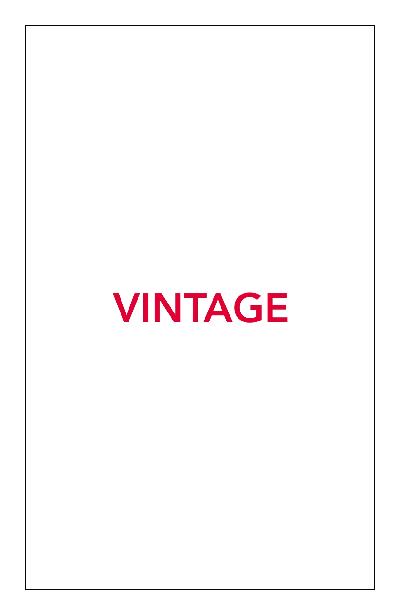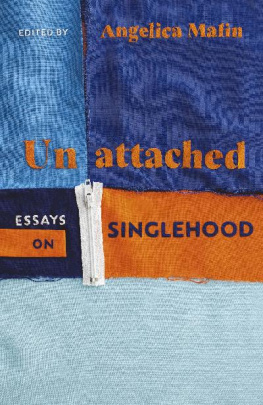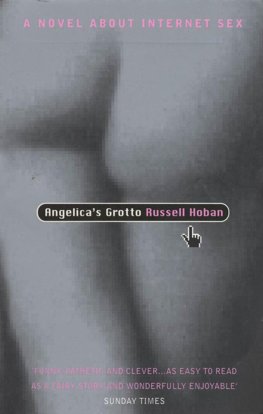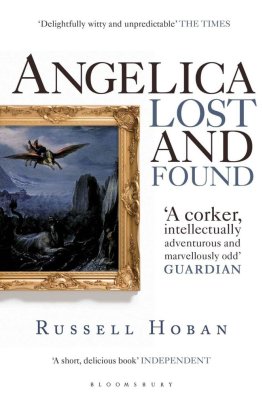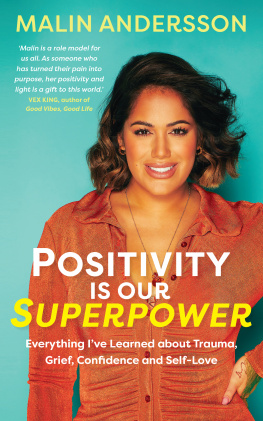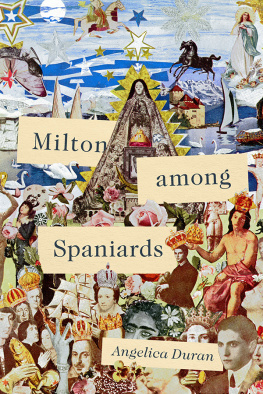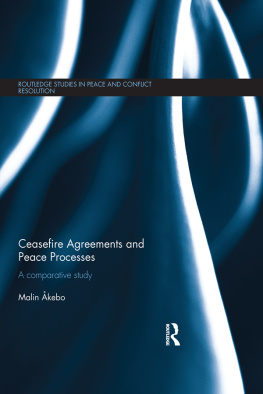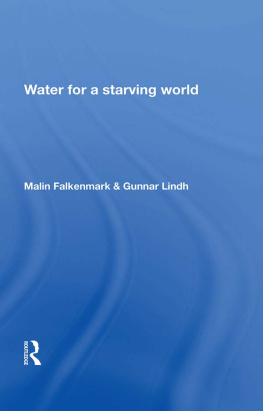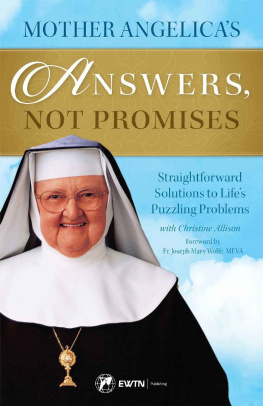Angelica Malin
UNATTACHED
Essays on Singlehood
Contents
Whats in a Peach?
Annie Lord
Better Off Alone (Than with the Wrong Person)
Ashley James
I Always Loved Being Single. The Challenge Was to Realise I Always Would
Bella DePaulo
The Joy of Romantic Friendships
Chant Joseph
Big Macs and Big Dicks
Charlie Craggs
Does Single Womanhood Bother Me?
Chloe Pierre
Writing Your Own Story
Felicity Morse
For Every Single Woman Whos Ever Been Told Shes the Problem Its Not You
Francesca Specter
Eat, Pray, Run
Jessica Morgan
Singlehood Unlimited: Solo Living in South India
Ketaki Chowkhani
The Decade Challenge
Lucie Brownlee
Sunday
Madeleine Spencer
Unapologetically Unattached
Megan Barton-Hanson
Dismantling the Dreamhouse
Mia Levitin
Finding Yourself Again + Amor Fati
Natalie Byrne
Navigating the Seasons of Friendships as a Single Woman
Nicola Slawson
Soulmates
Poorna Bell
Choosing Myself
Rachel Thompson
Hot Girl Summer
Rahel Aklilu
Im a Little Bit Jealous of My Single Friends
Rebecca Reid
There Is Nothing to Fear
Rose Stokes
The Golden Days
Rosie Wilby
A Single Woman Is the Closest Living Thing to a Goddess
Salma El-Wardany
The Hamster Wheel
Shani Silver
Stepping Off the Rollercoaster
Shaparak Khorsandi
One Year Without Sex, Love or Dating
Shon Faye
Why All Women Deserve to Experience Being Single in Their Thirties
Sophia Leonie
Empowering, Not Embarrassing: Why Egg-Freezing Shouldnt Feel Shameful
Sophia Money-Coutts
The Journey of Being Plus-Size and Single
Stephanie Yeboah
Me, Myself and My Toys
Venus Libido
About the Editor
ANGELICA MALIN is an award-winning entrepreneur based in London. She is the founder and Editor-in-Chief of About Time Magazine , one of the UKs leading lifestyle magazines, and runs #SheStartedItLIVE, a festival of female empowerment. Angelica is also the author of She Made It: The Toolkit for Female Founders in the Digital Age .
To my best friends Gemma and Claude, for everything.
Trigger warning
Before we begin, we want to inform you that in this collection of essays, some writers discuss sensitive topics such as domestic violence, abuse, bereavement and grief. This collection also brings up themes such as transphobia, homophobia, racism and discrimination.
If at any point, this book is triggering or upsetting, consider taking a break from reading, skipping the essay or stopping reading. Practice self-care before, during and after reading.
Introduction Take Your Broken Heart and Turn It into Art
ANGELICA MALIN
On Thursday 19 December 2019, at around 11 p.m., my heart shattered.
A wreckage of a life before this time lay all around me. For months I was unable to inhale without feeling a deep pain in my chest, right under the ribs.
My world flipped on its axis; date nights were replaced with late-night bowls of Apricot Wheats, my camera roll became a barrage of crying selfies, an imagined future disappeared overnight. I was sleepwalking through life, making two cups of builders tea, not one months after, there was always a cup of tea, in his favourite turquoise mug, slowly cooling on the countertop.
Weekends, once a thing of pleasure, mini-breaks and Netflix marathons, inherited a new sense of dread. Reaching a weekend used to feel triumphant; now it was characterised by a feeling of failure. Dread loomed over my week the vastness of space, which we once occupied with ease, now hung over me. I could see my whole life stretching out in front of me expansive, limitless, free and it terrified me.
An artificial Christmas tree, which Id bought in the days before the break-up, to mark our fifth Christmas together, sat in the corner of my living room, taunting me with its fake white snow and glittering fairy lights. The tree had been a symbol of compromise bringing some festive cheer into a traditional Jewish home and now it looked on, judging.
The tree stayed until March 2020, at which point the world flipped again, as we plunged into a global lockdown and life as we knew it ended. All my friends, in their respective couples, raced to sit down like a mad game of Musical Chairs and I was very, very alone.
The consolation prizes of being newly single disappeared overnight. Gone were the chances of dating, the distractions of the big city, the opportunity to make questionable life choices.
Its easy to look at your suffering after the fact, in the rear-view mirror after the immediacy of heartache has faded, and say, God, that made me strong. But at the time, you dont feel like that. At the time, you find yourself googling Can I die of a broken heart? at 3 a.m. and crying into a T-shirt that smells faintly of aftershave.
The pain feels raw and exposed youll do literally anything to take it away. But what Ive learned, from the eighteen months of government-imposed isolation, is theres no way to go around pain you have to go through it. Right to the centre. Right to the beating heart of it.
And when you come out the other side, you are a different person. Yes, youre stronger, of course. But youre also more self-compassionate. More capable of soothing yourself. More empathic to the world around you and its suffering. More grateful for every day.
Youre someone who has looked into the face of the thing you feared the most, took a deep breath and carried on. You are becoming a version of yourself that you never thought possible and you may never have got there without the pain.
This book would have never existed if it wasnt for that heartbreak.
I couldnt see that at the time, but our story is always unfolding in mysterious ways. Everyone has their own Sliding Doors moment, and what Ive learned is that you have to trust wildly, blindly that things are unfurling exactly as they are meant to. Things arent happening to you, they are happening for you.
In the months that followed, as the pandemic raged on, I started to see life differently. I luxuriated in late-night work sessions without feeling guilty, mid-morning bubble baths, weekends full of self-care I started unfurling from a couple and rediscovering myself. We dont realise at the time the extent to which were shaped and constrained by another person; I was no longer defined by the other, but was a person in my own right. One who survived a pandemic, living alone, with a Monstera plant called Charlie for company.
When you emerge from a relationship, you rediscover parts of yourself that feel long forgotten, like embracing an old friend. Slowly you start to see the shape of yourself as a whole person not one whos half of a pair. Your tastes, your personal goals, your latent desires, they begin to emerge again. Its easy to forget these things, when youre working so hard to fit perfectly into half of a whole. I dont blame you the journey of discovering yourself is not made easy by the world we live in. The world is simpler in a couple; M&S meal deals, two-for-one cinema tickets, Valentines Day set menus youre more digestible and commercially viable to the world when youre in a couple.
In many ways, I think we fear a single woman. Shes powerful, self-assured and independent. The world wants women who are insecure and self-conscious, because they are easier to sell to. Should we fear being single or does the world just make us fear it, because a single woman is a force to be feared? By diverting from the narrative that you need to be coupled up to be happy, you are literally turning a commercial model on its head.
